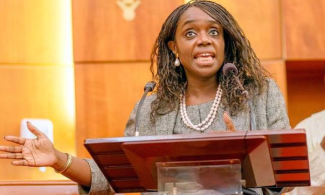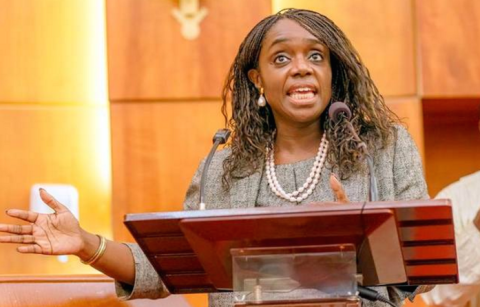
Finance Minister Kemi Adeosun has stated that President Muhammadu Buhari's administration inherited an “empty treasury”. Ms. Adeosun made the statement while discussing the state of the Nigerian economy on Channels TV on Thursday morning.
The Finance Minister explained that poor management of the economy under her predecessor, Ngozi Okonjo-Iweala, was partially to blame for Nigeria’s economic downturn.
Ms. Adeosun added that, during the previous administration, Nigeria enjoyed high oil prices, but President Goodluck Jonathan's government failed to save and invest in non-oil sectors during the boom period. She explained that such investment would have built a safety net for the country for when oil prices inevitably fell.
Ms. Adeosun stressed the need for the diversification of the Nigerian economy and the country's revenue base.

“If you look at oil, it’s only 13 percent of our GDP, but it represents 70 percent of the government’s revenue, which means if anything happens to oil, it affects everybody," the minister said.
She explained that the 87 percent of the GDP that is not generated from oil should constitute more than just 30 percent of the government’s revenue. This would make the economy more stable, predictable, and less volatile.
Ms. Adeosun also stressed that the government needs to spend its money more effectively. Only 10 percent of the government’s spending is allocated towards capital investment, which is far too low to generate economic growth, according to the minister.
She added that the remaining 90 percent is spent on recurrent expenses, including salaries, travel expenses, and training exercises. Such expenditures contribute little to the economy, Ms. Adeosun explained.
Ms. Adeosun declared that the excessive recurrent adds little to economic growth. "Capital is what grows your economy,” she said.
The minister explained that spending on capital projects, such as the construction of roads, power plants, railways, housing, and bridges, creates jobs and fuels sustainable growth.
Ms. Adeosun added that Ethiopia, one of Africa’s fastest growing economies, at one point had capital expenditures of 60 percent. If Nigeria wants to catch up, it must spend more than 10 percent of its budget on capital. She stated that the present administration was aiming to increase its capital expenditure to 30 percent.